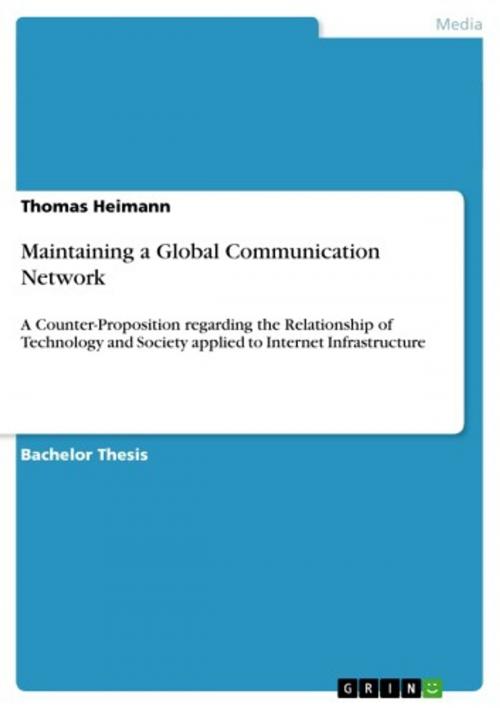Maintaining a Global Communication Network
A Counter-Proposition regarding the Relationship of Technology and Society applied to Internet Infrastructure
Nonfiction, Computers, Application Software, Multimedia| Author: | Thomas Heimann | ISBN: | 9783640561131 |
| Publisher: | GRIN Publishing | Publication: | March 10, 2010 |
| Imprint: | GRIN Publishing | Language: | English |
| Author: | Thomas Heimann |
| ISBN: | 9783640561131 |
| Publisher: | GRIN Publishing |
| Publication: | March 10, 2010 |
| Imprint: | GRIN Publishing |
| Language: | English |
Bachelor Thesis from the year 2008 in the subject Communications - Multimedia, Internet, New Technologies, grade: 1.3, Bielefeld University, course: Politikwissenschaft, language: English, abstract: The question at heart of this paper is how society manages to maintain what has become its most important communication network, the Internet. The coordinative mechanisms necessary to achieve this are regarded as governance mechanisms. Since 'governance' is understood as a property of social systems and 'Internet infrastructure' relates to a technological system, two system/environment relations need to be observed: technology as the environment of society and society as the environment of technology. This circular system/environment relationship complicates the notion of governance, because governance (the establishment of social coordination) shapes and limits Internet architecture (the basic design principles of the Internet platform) and Internet architecture shapes and limits governance. Thus, before governance mechanisms regarding Internet infrastructure can be addressed, some preliminary considerations have to be made regarding the interaction between society and technology in general. This topic has been the subject of many academic publications covering disciplines such as sociology, political science, economics and network engineering; but the solutions proposed usually tend to either oversimplify the problem or use the jargon of complex systems to paraphrase them. The approach presented here examines the fundamental technical principles of Internet connectivity, sets them in relationship to social systems and regards 'Internet governance' as contextual intervention (Willke 1989).
Bachelor Thesis from the year 2008 in the subject Communications - Multimedia, Internet, New Technologies, grade: 1.3, Bielefeld University, course: Politikwissenschaft, language: English, abstract: The question at heart of this paper is how society manages to maintain what has become its most important communication network, the Internet. The coordinative mechanisms necessary to achieve this are regarded as governance mechanisms. Since 'governance' is understood as a property of social systems and 'Internet infrastructure' relates to a technological system, two system/environment relations need to be observed: technology as the environment of society and society as the environment of technology. This circular system/environment relationship complicates the notion of governance, because governance (the establishment of social coordination) shapes and limits Internet architecture (the basic design principles of the Internet platform) and Internet architecture shapes and limits governance. Thus, before governance mechanisms regarding Internet infrastructure can be addressed, some preliminary considerations have to be made regarding the interaction between society and technology in general. This topic has been the subject of many academic publications covering disciplines such as sociology, political science, economics and network engineering; but the solutions proposed usually tend to either oversimplify the problem or use the jargon of complex systems to paraphrase them. The approach presented here examines the fundamental technical principles of Internet connectivity, sets them in relationship to social systems and regards 'Internet governance' as contextual intervention (Willke 1989).















